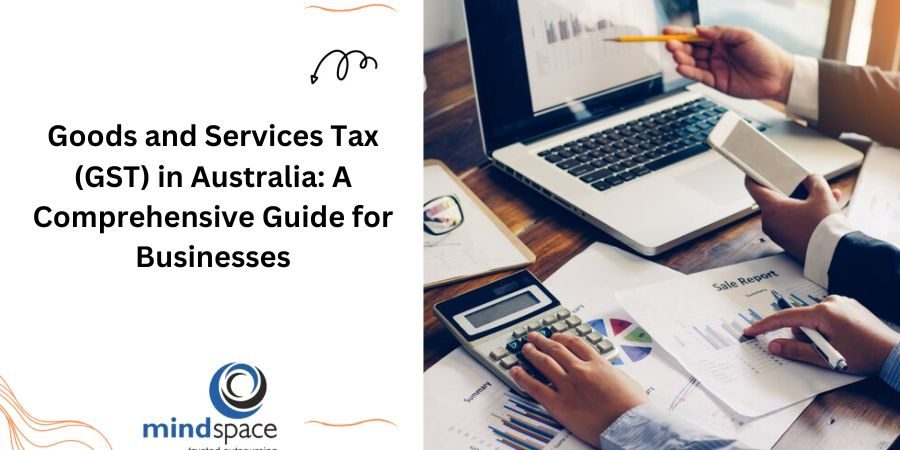Goods and Services Tax (GST) in Australia: A Comprehensive Guide for Businesses
In Australia, the Goods and Services Tax (GST) plays a crucial role in the country’s tax system. As a business owner, understanding how GST works is essential for maintaining compliance and managing your financial responsibilities. This comprehensive guide will walk you through the fundamentals of GST in Australia, the GST return process, and the steps to claim a GST refund. We’ll also discuss how partnering with an Australia Accounting Firm and utilizing Payroll Services Australia can streamline your business’s GST management.
What is the Goods and Services Tax (GST) in Australia?
Goods and Services Tax (GST) is a value-added tax levied on most goods and services sold for domestic consumption in Australia. The standard GST rate in Australia is 10%, and it applies to a wide range of products, services, and transactions. It’s important to note that businesses with a turnover of $75,000 or more per year are required to register for GST.
GST affects various aspects of a business’s financial operations, including pricing, invoicing, and tax reporting. When your business is registered for GST, you are required to collect this tax from customers and remit it to the Australian Taxation Office (ATO).
Must Read: A Complete Guide to Bookkeeping Services in Australia: Streamline Your Business Finances
How Does GST Work for Businesses?
When your business is GST-registered, you must:
- Charge GST on Sales: When you sell goods or services, you charge your customers the applicable GST (10%) on top of the sale price.
- Claim GST Credits: When you purchase goods or services for your business, you can claim back the GST you paid on those purchases as a credit.
This means you only need to remit to the ATO the difference between the GST you collected on sales and the GST you paid on your purchases.
GST Return Australia: Filing Your GST
As a GST-registered business, you are required to file GST Returns Australia regularly. This process involves reporting your total sales, purchases, and the GST you owe or are entitled to claim as credits. Businesses typically file GST returns quarterly or annually, depending on their turnover and ATO requirements.
To file your GST return, you will need to:
- Report all sales and the corresponding GST collected.
- Report all purchases and the GST paid.
- Calculate the net GST payable or refundable (difference between collected and paid GST).
An accurate and timely GST return is essential to avoid penalties and ensure compliance with Australian tax laws.
Suggested Read: Outsourcing Services: Top bookkeeping service for Australia
How to Claim a GST Refund Australia?
If your business has paid more GST on purchases than it has collected from sales, you may be entitled to a GST Refund Australia. This typically occurs if:
- You have purchased more goods or services than you have sold.
- You’ve had business expenses that incurred more GST than the GST you collected from your customers.
To claim a GST refund, you need to report the excess GST in your GST return. The ATO will process your claim, and if eligible, you will receive a refund.
The Role of an Australia Accounting Firm in GST Management
Navigating the complexities of GST can be challenging, especially for new business owners. This is where partnering with a reliable Australia Accounting Firm can be a game changer. These firms specialize in managing GST compliance, helping you:
- Register for GST with the ATO.
- Prepare and file accurate GST returns on time.
- Ensure all business transactions are properly documented to claim eligible GST credits.
- Stay updated on any changes in GST regulations and tax rates.
An accounting firm can also assist in optimizing your GST strategy, ensuring you avoid common pitfalls and remain compliant with Australian tax laws.
Suggested Read: Outsourcing Bookkeeping: Boost Your Accounting Firm’s Success
Payroll Services Australia and GST
For businesses with employees, it’s essential to understand how GST intersects with payroll. While Payroll Services Australia focuses on managing employee wages, superannuation, and other benefits, it also plays a role in your overall GST management. This is because some payroll expenses, such as contractor payments or business expenses related to employment, may include GST.
Utilizing Payroll Services Australia can help ensure your payroll is compliant with GST requirements, avoid errors in tax reporting, and ensure that all eligible payroll-related GST credits are claimed.
GST Compliance Tips for Businesses in Australia
To manage GST effectively and ensure compliance with the ATO, here are a few key tips for businesses:
- Keep Accurate Records: Maintain detailed records of all sales, purchases, and expenses to track the GST you’ve collected and paid.
- File Returns on Time: Late or inaccurate GST returns can result in penalties. Set reminders to file your returns before the due date.
- Understand GST on Imports and Exports: International transactions can have unique GST implications, especially if you are importing or exporting goods and services.
- Review Your GST Position Regularly: Evaluate your GST obligations periodically to avoid any surprises and ensure your business is in good standing with the ATO.
- Seek Professional Help: If you are unsure about any aspect of GST, seek advice from a qualified accountant or tax professional, particularly an Australia Accounting Firm.
Suggested Read: A Complete Guide to Accounting Services That Small Businesses Must Have
Conclusion
GST is a fundamental aspect of running a business in Australia, and understanding the ins and outs of GST Return Australia, GST Refund Australia, and its integration with Payroll Services Australia is essential for compliance and financial success. By working with an Australia Accounting Firm, you can simplify your tax obligations, optimize your financial operations, and focus on growing your business. Stay informed, keep accurate records, and seek expert guidance to ensure your GST obligations are met efficiently and effectively.


